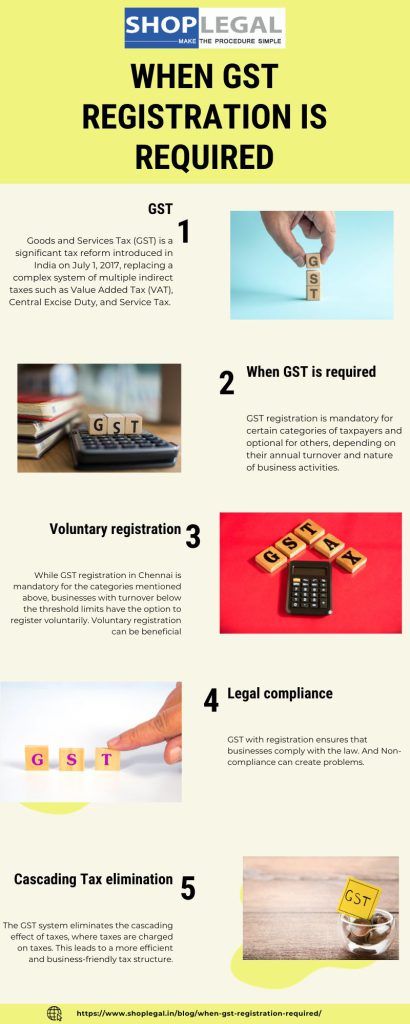When GST registration is required
TALK TO EXPERTS
Goods and Services Tax (GST) is a significant tax reform introduced in India on July 1, 2017, replacing a complex system of multiple indirect taxes such as Value Added Tax (VAT), Central Excise Duty, and Service Tax. GST is a destination-based tax that is levied on the supply of goods and services at every stage of the supply chain, from the manufacturer to the consumer. GST registration in Chennai is a crucial aspect of this tax regime, and it is required under specific circumstances.
In this essay, we will explore when GST registration is required, the criteria for registration, and its significance in the Indian taxation system.
GST Registration: An Overview
GST registration is the process by which businesses and individuals obtain a unique GSTIN (Goods and Services Tax Identification Number) from the government.
This GST registration in Chennai allows them to collect GST from their customers, claim input tax credit on the GST paid on their purchases, and file GST returns.
The process is carried out online through the GST portal, making it accessible and convenient for taxpayers.
When GST Registration is required:
GST is mandatory for certain categories of taxpayers and optional for others, depending on their annual turnover and nature of business activities. The following are the primary scenarios in which GST registration is required:
Mandatory Registration Based on Turnover:
Aggregate Turnover Threshold:
The most common criterion for mandatory GST registration is the aggregate turnover threshold. As per the GST Act, businesses with an aggregate turnover exceeding Rs. 40 lakhs (Rs. 10 lakhs for special category states) in a financial year must register for GST.
However, certain states have opted for a lower threshold of Rs. 20 lakhs (Rs. 10 lakhs for special category states) for specific categories of businesses.
Casual Taxable Person:
Any person who occasionally undertakes transactions involving the supply of goods or services and does not have a fixed place of business is considered a casual taxable person and must have GST registration in Chennai, regardless of their turnover.
Non-Resident Taxable Person:
Non-resident taxable persons providing taxable goods or services in India are required to register for GST, irrespective of their turnover.
Mandatory Registration Irrespective of Turnover:
Interstate Supply:
If a business engages in the supply of goods or services from one state to another, GST registration is mandatory, regardless of the turnover.
E-commerce Operators:
E-commerce platforms that facilitate the supply of goods or services through their portals must obtain GST , irrespective of their turnover.
Input Service Distributor (ISD):
ISDs are required to have GST registration in Chennai, even if they do not make taxable supplies themselves. They distribute input tax credit to their branches or units.
Tax Deductors at Source (TDS):
Entities responsible for deducting TDS under GST are required to register, regardless of their turnover.
Tax Collectors at Source (TCS):
Entities collecting TCS under GST must register, irrespective of their turnover.
Voluntary Registration:
While GST registration in Chennai is mandatory for the categories mentioned above, businesses with turnover below the threshold limits have the option to register voluntarily. Voluntary registration can be beneficial as it allows businesses to claim input tax credit and participate in the formal economy.
The Process of GST Registration:
GST involves several steps, including the submission of relevant documents and information to the GST portal. Here is a simplified overview of the registration process:
Visit the GST Portal:
The taxpayer must visit the official GST portal and initiate the registration process.
Provide Basic Information:
The applicant needs to provide basic information such as the legal name of the business, its permanent account number (PAN), email address, and mobile number.
Verification:
The provided mobile number and email address are verified through an OTP (One-Time Password) sent to the respective contact points.
Fill the GST Registration Form:
After successful verification, the applicant must fill out the form for GST registration in Chennai with detailed information about the business, including its constitution, principal place of business, directors/partners, and bank account details.
Upload Documents:
Supporting documents, such as proof of business address, PAN, bank statements, and photographs of authorized signatories, must be uploaded as per the requirements.
Application Submission:
Once all required information and documents are provided, the application is submitted on the GST portal.
Application Processing:
The GST authorities review the application and may seek additional information or clarification if necessary.
GSTIN Allocation:
Upon approval, the applicant is provided with a unique GSTIN and a GST registration certificate.
Filing GST Returns:
After obtaining GST registration in Chennai, the taxpayer is required to file regular GST returns, which include details of their sales, purchases, and tax liabilities.
Significance of GST Registration:
GST registration holds immense significance in the Indian taxation system for various reasons:
Legal Compliance:
GST with registration ensures that businesses comply with the law. And Non-compliance can create problems.
Input Tax Credit:
Registered businesses can claim input tax credit on the GST paid on their purchases. This reduces the overall tax liability and helps in avoiding cascading taxes.
Access to Wider Market:
Interstate suppliers and e-commerce operators must register for GST. This opens up a wider market for businesses, promoting interstate trade.
Transparency:
GST is designed to bring transparency to the tax system by digitizing tax records, reducing tax evasion, and enabling better tax administration.
Cascading Tax Elimination:
The GST system eliminates the cascading effect of taxes, where taxes are charged on taxes. This leads to a more efficient and business-friendly tax structure.
Competitiveness:
GST that has GST registration in Chennai promotes competitiveness by simplifying tax procedures and reducing the compliance burden on businesses.
Conclusion
In conclusion, GST registration is a critical requirement in the Indian taxation system, and it is mandatory for businesses that meet specific turnover and activity criteria.
It not only ensures legal compliance but also provides businesses with access to input tax credit, eliminates the cascading effect of taxes, and promotes transparency and competitiveness in the market.
Therefore, understanding when and how to register for GST is essential for all businesses operating in India to thrive in the evolving tax landscape.








